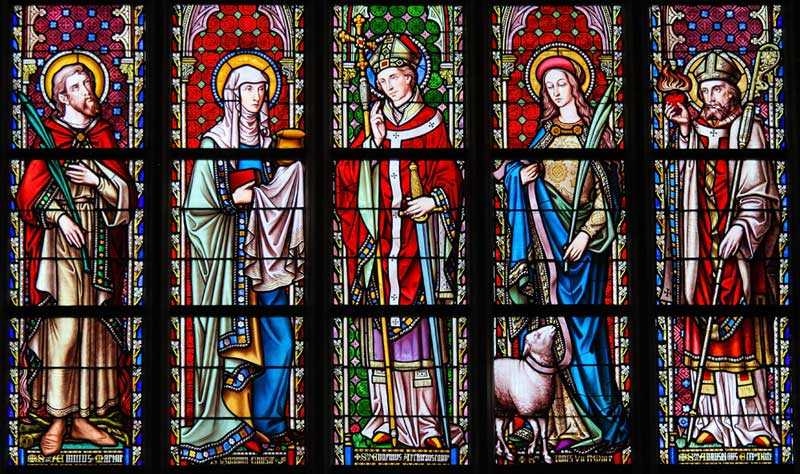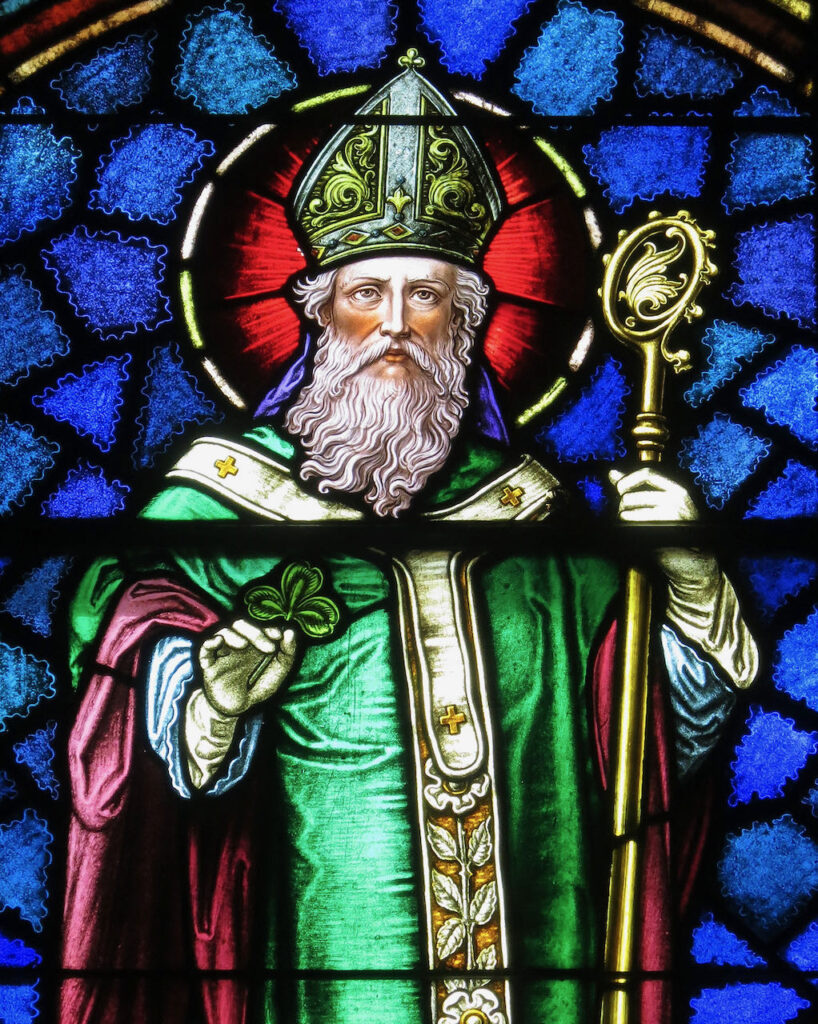No, I’m not confessing to anything I’ve done, but I’m not comfortable with being called a “Saint.” In fact, I’m a little embarrassed by the title, “Latter-Day Saint” — it seems presumptuous to assume that I am a saint.
Let me explain.
From my perspective, looking ahead, I think “saint” is a description for a person or people at some later time, perhaps at the end times when the servant comes forth in opposition to the Arch Tyrant. Those that come out of Babylon are saints. Certainly a goal. But really, what does it mean to be a saint, and is there a better word for all it encompasses? Perhaps the word “saint” has been misrepresented throughout history. Perhaps it has become watered-down — as in thanking someone — “thanks so much, you’re a saint.” Or all those saints associated with holidays — such as St. Patrick’s Day. My dad had a way with acronyms and exclamations — he would say, “oh, my sainted aunt!” Not sure who that was.
What does it mean to be a saint?
I searched to determine how the English word “saint” evolved — what the original meaning was in the Hebrew language? What about Greek or Aramaic?
Going backward: We get the English word “saint” from the Latin word “Sanctus,” which is translated from the Greek word “ἅγιος” (hagios), which means “holy.” The Aramaic word is Qaddiysh (Aramaic). The Hebrew word is Kadosh or qaddish — holy, holy people.
There is no word in Hebrew for “saint,” as we tend to understand it. The Hebrew word that gets translated “saint” or “holy people” in many English Bibles is qad·dî·šîn — קַדִּישִֽׁין׃ (holy) (Adjective, masculine plural.) Kadosh.
I found an interesting explanation from a Hebrew perspective on Quora:
There is no concept of “saint” in the Hebrew bible, but the entire Jewish people are commanded to be קדוש – KADOSH and therefore the Hebrew bible considers this to be something that human beings are both capable of achieving and that one who makes an effort to reach this status will be helped if he is sincere. (Yonatan Rocha, Quora)
I like that idea — a commandment to be Kadosh — something that we mortals can achieve, and God helps us when we are sincere. But when you become a saint, are you still mortal? Or is there a transformation —
The Hebrew prophets do not speak of latter-day Saints until the Saints have proven themselves. Those who survive the earth’s cleansing, for example, are properly called Saints (Hebrew q¯adô˘˘s, also “holy/holy ones”; Isa. 4:3; 13:3; Dan. 7:18, 22, 27).
A Saint describes one who is holy as the Lord is holy (Lev. 11:44; 20:26; 1 Pet. 1:15–16).
Saints are sanctified through Jesus Christ (Heb. 2:11; 10:10).
They are sanctified by yielding their hearts to God (Hel. 3:35).
They are sanctified by the power of the Holy Ghost (Alma 5:54; 13:12).
To be “sanctified” means to have one’s garments washed white through the blood of the Lamb (Alma 13:11); it means to be perfected in Christ (Moro. 10:33). (Gileadi, Last Days, pg. 98)
So, in the Hebrew sense of the word, it is more a holy person or the holy ones. Something we are reaching to become in our lives. For many of us. Not so for many others.
The counterpart of Isaiah’s wicked city is the City of Righteousness, a holy city. It is the city of Israel’s God, a place of solemn assemblies, an abode of peace. That city—Zion/Jerusalem—survives the arch tyrant’s desolation of the earth and rises, regenerated, from the dust. Her residents are “holy ones”—saints—whom God delivers in the selfsame hour that he destroys Babylon. God’s deliverance of the righteous, in effect, consists of his destruction of the wicked, they being two aspects of the same end time drama. (The Last Days, Gileadi, p.98)
Other things called holy or sanctified — the Sabbath is the only day of the week that is called holy. It is a day set apart, sacred. The Sabbath is the seventh day — the day of rest, the day symbolic of the millennial rest, Zion. Those that live in Zion are sanctified and holy people. Saints in the true meaning.
Further examples of “saints” —
The Lord, in the Doctrine and Covenants, calls the believing Gentiles “Saints” (compare D&C 115:3–4). He clarifies the term Saints, however, as something the Gentiles aspire to, rather than something that describes all believing Gentiles (see D&C 89:3; 125:2). In that respect, the Doctrine and Covenants follows the New Testament. The believing Gentiles of the early Church were also “called to be saints” (Rom. 1:7; 1 Cor. 1:2). The Apostles ministered to the early Saints (2 Cor. 8:4; Heb. 6:10), both Gentiles and Jews (compare Eph. 2:19).
The Saints constituted all “faithful brethren in Christ” (compare Col. 1:2). A scriptural definition identifies Saints as belonging to the church of the Lamb (1 Ne. 14:12). They become Saints through Christ’s atonement (Mosiah 3:19). They put off the natural man and are as little children (Mosiah 3:19). They exercise faith in Jesus (Rev. 14:12). They receive a remission of their sins and the gift of the Holy Ghost (Moro. 8:26).
The Saints are those who keep all God’s commandments (Rev. 14:12; D&C 89:18). They pray to God (Rev. 5:8; 8:3–4), give him thanks (Eph. 5:3–4), and fear him (Ps. 34:9; 89:7). They are united by observing the celestial law and doing the will of God (D&C 105:3–5; 125:2).
The Saints are God’s servants (D&C 121:6). They are called to various callings for the perfecting of the Saints (Eph. 4:11– 12). They assist one another according to their needs (Rom. 16:2; D&C 105:3). They serve both the living and the dead (D&C 97:13; 124:29, 143).
The Saints are filled with a perfect love (Moro. 8:26), which love is charity (compare v. 17). The Saints are patient under trials (Rev. 13:10; 14:12), willing to submit to all that the Lord inflicts on them (Mosiah 3:19). They endure the crosses of the world and despise the shame of it (2 Ne. 9:18). They do no wickedness (Eph. 5:3–4). The wicked persecute the Saints and heap abuses on them (D&C 121:38; 123:1); the wicked shed the blood of the Saints (Rev. 16:6; 2 Ne. 26:3; Eth. 8:22).
The Saints are righteous (2 Ne. 9:18). Their names are written in the book of life (Isa. 4:3; compare D&C 85:11).
The Saints know the mysteries of God (Col. 1:26–27); God pours knowledge on their heads (D&C 89:19; 121:33). The Saints know God’s faithfulness (Ps. 89:5); they have experience with God’s love (Eph. 3:17–19).
The Saints are the Lord’s anointed ones (D&C 109:80), the elect of God (Col. 3:12); Aaron, a high priest, typifies their office (Ps. 106:16; compare Lev. 8:1–12; 21:6, 8, 10).
The Saints receive a fulness of joy (2 Ne. 9:18, 43; Enos 1:3). They receive “health in their navel and marrow to their bones” (D&C 89:18). They receive an inheritance of glory (Eph. 1:18). They inherit the kingdom of God (2 Ne. 9:18). God Almighty is their King (Rev. 15:3).
There are some beautiful images of what some religions call saints. I was going to read about St. Patrick — but I got detoured on all that a saint encompasses.


